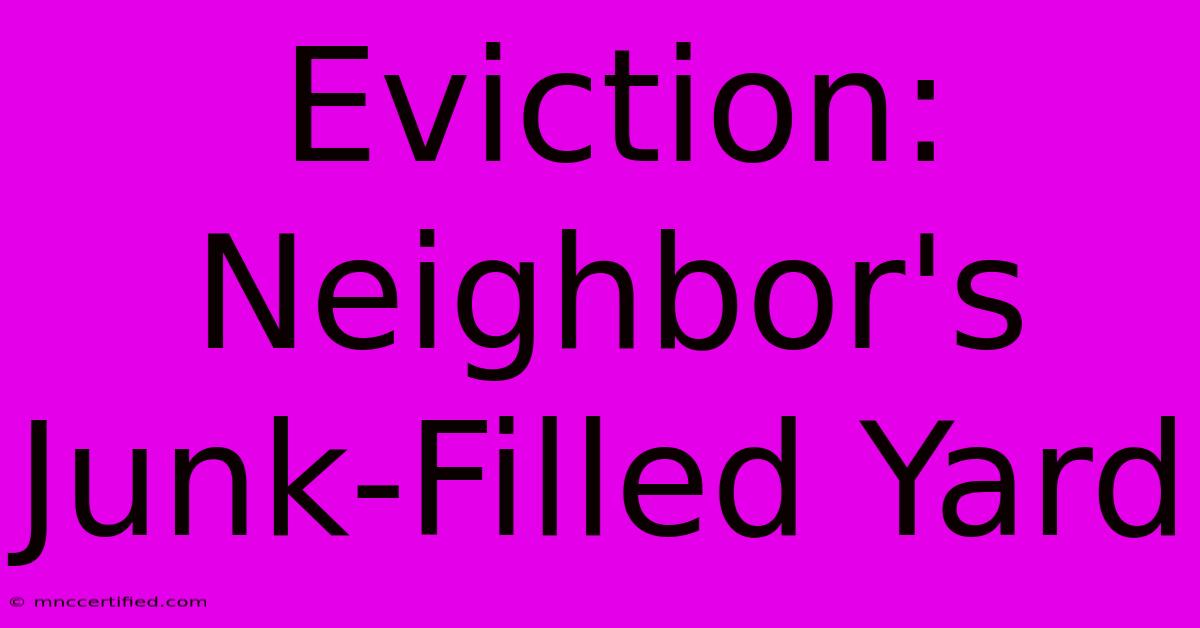Eviction: Neighbor's Junk-Filled Yard

Table of Contents
Eviction: Neighbor's Junk-Filled Yard – Protecting Your Property Value and Well-being
A neighbor's overflowing yard, resembling a junkyard more than a residential property, can significantly impact your quality of life and property value. This isn't just an aesthetic issue; it can attract pests, pose safety hazards, and even violate local ordinances. This article explores the steps you can take when facing this frustrating situation, focusing on how to address the issue and potentially initiate eviction proceedings if necessary.
Understanding the Problem: More Than Just an Eyesore
A junk-filled yard isn't merely unsightly; it presents several serious concerns:
- Property Value Depreciation: Curb appeal is crucial for property value. A neighboring property in disrepair directly impacts your home's perceived worth, potentially reducing its resale value.
- Pest Infestation: Accumulated trash attracts rodents, insects, and other pests, which can easily spread to your property. This can lead to costly pest control measures and health risks.
- Safety Hazards: Overgrown vegetation, dilapidated structures, and piles of debris create fire hazards and potential tripping or injury risks.
- Health Concerns: Accumulated garbage can lead to unsanitary conditions and the potential spread of disease.
- Violation of Local Ordinances: Most municipalities have ordinances regulating property maintenance, including limits on junk accumulation. Your neighbor may be in violation of these laws.
Addressing the Issue: A Step-by-Step Approach
Before considering drastic measures like eviction, attempt to resolve the issue amicably:
1. Friendly Conversation:
- Choose the right time and place: Approach your neighbor calmly and privately, avoiding confrontational language.
- Express your concerns clearly and respectfully: Focus on the impact on your property and well-being, not personal attacks.
- Offer solutions: Suggest resources, such as local waste removal services or community cleanup programs.
2. Documentation is Key:
- Photos and Videos: Document the extent of the junk accumulation with clear, dated photos and videos. This evidence is crucial if you need to escalate the matter.
- Written Communication: Send a registered letter outlining your concerns, the negative impacts on your property, and your attempts at amicable resolution. Keep a copy for your records.
3. Involve Your Landlord or HOA (if applicable):
- Rental Property: If you rent, report the issue to your landlord. They have a responsibility to ensure the property's overall condition and may have legal recourse against the offending neighbor.
- Homeowners Association (HOA): If you live in a community with an HOA, contact them. They have rules and regulations regarding property maintenance and can enforce them.
4. Contacting Local Authorities:
- Code Enforcement: If amicable efforts and involvement with your landlord/HOA fail, contact your local code enforcement department. They can investigate whether the property violates local ordinances. Your documentation will be invaluable here.
- Environmental Health Department: If unsanitary conditions exist, contact your local environmental health department. They can address potential health hazards.
- Police Department: In extreme cases, involving significant safety hazards or criminal activity, contact your local police department.
Eviction as a Last Resort: Legal Considerations
Eviction is a complex legal process and should only be considered as a last resort after exhausting all other options. You will likely need legal counsel to navigate the complexities of eviction laws in your jurisdiction. The grounds for eviction related to a junk-filled yard usually center on violations of local ordinances or lease agreements (if applicable). The process typically involves:
- Filing a formal complaint: This usually involves submitting documentation of the problem and the failed attempts at resolution.
- Court hearings: You may need to appear in court to present your case.
- Legal representation: Seeking legal advice from a qualified attorney specializing in landlord-tenant law or property disputes is crucial.
Disclaimer: This article provides general information and does not constitute legal advice. The specifics of eviction laws vary greatly by location. It's essential to consult with a legal professional to understand your rights and options in your specific situation. Always prioritize safe and legal methods for addressing neighbor disputes. The information above is intended to serve as a guide, not a substitute for professional advice.

Thank you for visiting our website wich cover about Eviction: Neighbor's Junk-Filled Yard. We hope the information provided has been useful to you. Feel free to contact us if you have any questions or need further assistance. See you next time and dont miss to bookmark.
Featured Posts
-
Justin Tuckers Field Goal Woes
Nov 18, 2024
-
Khameneis Health Latest Updates
Nov 18, 2024
-
Top Players To Watch Falcons Vs Broncos
Nov 18, 2024
-
Uk Snow Ice Warnings Colder Weather Forecast
Nov 18, 2024
-
Keanes Reaction Son In Laws England Debut Goal
Nov 18, 2024